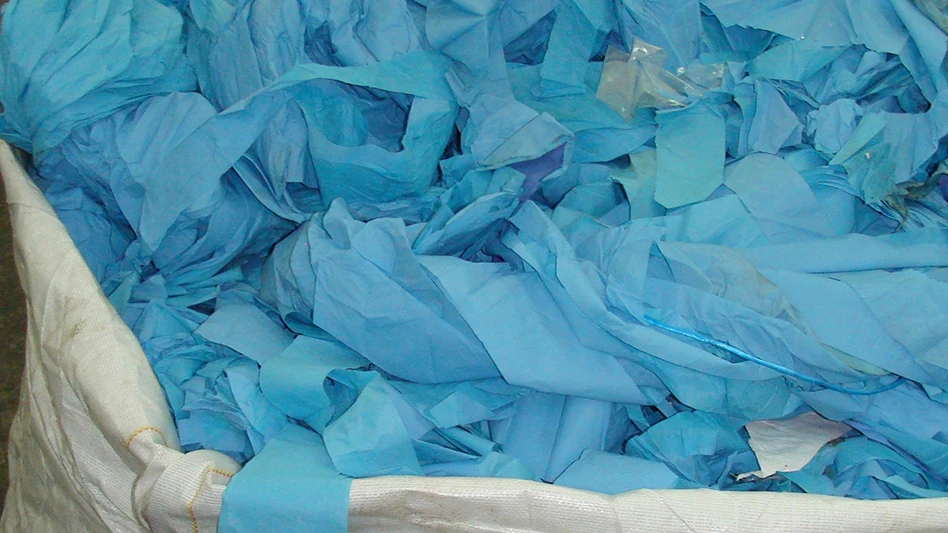
Recycling Today archives
Mura Technology is preparing to open its doors to what it calls the world’s first commercial scale HydroPRS advanced plastic recycling site in Teesside, England. Mura says the HydroPRS process “complements mechanical recycling [and] enables a circular plastics economy through the production of recycled plastic feedstock for the manufacture of new plastic.”
The London-based provider of the plastics chemical recycling technology has received considerable financial backing and has forged alliances with multinational firms including Dow Chemical, LG Chem, Igus and Chevron Phillips Chemical (CPChem).
Mura says its HydroPRS technology deployed in Teesside can efficiently recycle "unrecyclable" postconsumer flexible, rigid and multilayered plastics into high-quality, recycled liquid hydrocarbons that can replace the use of virgin fossil-based oils in the manufacture of new plastic.
The Teesside site has the capacity to produce 20,000 metric tons annually of recycled-content hydrocarbon feedstocks, and additional commercial-scale HydroPRS facilities are under development by Mura in the United States and Germany.
This week, Mura says key representatives from the advanced recycling and plastic manufacturing value chains will gather at the site, joined by Teesside Mayor Ben Houchen, who will deliver a speech highlighting the positive impact of the new site on the local economy and workforce.
While the event marks what Mura calls the beginning of commissioning, the first recycled hydrocarbon products are not expected to be delivered to Mura’s offtake partners until early next year.
Attendees at this week’s event are expected to include Marco ten Bruggencate, Dow vice president and the president of the Brussels-based trade group Plastics Europe; Benny Mermans, vice president at CPChem; Jinsuk Kim, managing director of LG Chem Europe; Doug Kelly, vice president of technology at engineering firm KBR (Mura’s license and engineering partner); and Paul Davidson of the UK Smart Sustainable Plastic Packaging Challenge.
The purpose-built facility at the Wilton International industrial site in Teesside will process flexible and rigid mixed plastics, including films, which can have a low recycling rate in many nations and regions.
The site has been designed with a scope to expand production capacity to over three times its initial size, Mura says.
“The opening of our first-of-its-kind, next-generation recycling facility is a groundbreaking achievement and the culmination of four years of dedication,” Mura Technology CEO Steve Mahon says.
“Our HydroPRS process is unlocking a new market for plastic [scrap], creating value and keeping both plastic and carbon in circularity. The technology works alongside existing mechanical recycling to ensure no plastic types are considered ‘unrecyclable’ and require incineration or landfilling.
“With support from our partners, the Teesside site will be the first in Mura’s global rollout, helping in the fight against the plastic pollution and global warming crises and acting as a launchpad for the 1 million metric tons of annual recycling capacity that Mura plans to have in operation and development in this decade.”
Unlike a pyrolysis process, Mura says HydroPRS uses supercritical water, or water under high pressure and high temperature, to convert postconsumer, multilayered, flexible and rigid plastics such as films, pots, tubs and trays into “stable, premium hydrocarbon feedstocks.”
“When available, this fossil-replacement recycled naphtha from Mura will enable Dow to produce circular plastics [that] are in high demand from global brands,” says Karen S. Carter, president of the Packaging and Specialty Plastics business unit at Dow.
Through this process, there is no limit to the number of times the same material can be recycled, Mura says, “meaning HydroPRS has the potential to significantly reduce single-use plastics and permanently increase material circularity in the plastics industry.”
By providing a route to recycling these materials, Mura says it is creating a complementary process to sit alongside traditional mechanical recycling, a path it says was highlighted in a recent technical report by the European Commission’s Joint Research Centre (JRC).
The firm says independent life cycle assessments (LCAs) based on the process in Teesside have shown the HydroPRS process provides an 80 percent carbon emissions saving by diverting plastic scrap away from incineration.
“When compared to fossil oil-based feedstock, HydroPRS produces products with an equivalent or lower ‘global warming potential’ and saves up to five barrels of oil for every metric ton” of plastic scrap processed, according to Mura.
The company has been supported by investment from companies including KBR, Dow, CPChem, LG Chem and Igus GmbH.
Additionally, Mura has secured partnerships with Mitsubishi Chemical Corp., LG Chem and GS Caltex Corp. for the development of HydroPRS facilities under license in Japan and South Korea. The HydroPRS process has been developed using a core technology originally designed by Licella Holdings Ltd. of Australia.
Latest from Recycling Today
- BMW Group, Encory launch 'direct recycling’ of batteries
- Loom Carbon, RTI International partner to scale textile recycling technology
- Goodwill Industries of West Michigan, American Glass Mosaics partner to divert glass from landfill
- CARI forms federal advocacy partnership
- Monthly packaging papers shipments down in November
- STEEL Act aims to enhance trade enforcement to prevent dumping of steel in the US
- San Francisco schools introduce compostable lunch trays
- Aduro graduates from Shell GameChanger program





